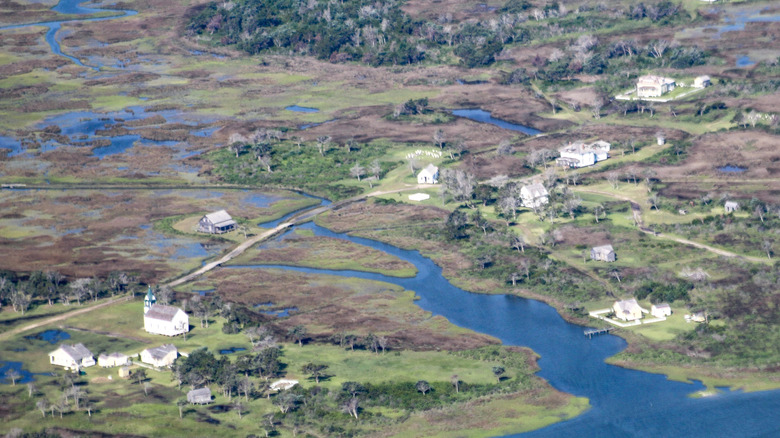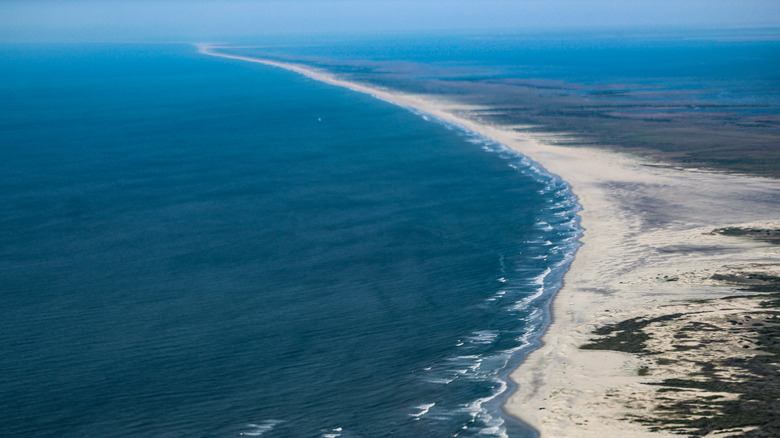A Once-Lively North Carolina Island Town Is Now A Unique Abandoned Destination To Explore
Stepping into the uninhabited town of Portsmouth is like stepping back through time. Although its former residents have long since disappeared, the homes and buildings remain much as they were in this once bustling maritime village. Situated on Portsmouth Island, North Carolina, it's part of the Cape Lookout National Seashore in the Outer Banks just off the coast. And just like another North Carolina beach you can't get to by car, Portsmouth is only accessible by boat. If you're coming from the mainland, it's easiest to take a car-friendly ferry from the town of Atlantic — about three hours from Raleigh, NC.
There are no paved roads, but 4WD vehicles can navigate the terrain, leaving you free to roam the island at your own pace. If you're bringing your own 4WD or RV, the ferry from Atlantic takes around 45 minutes and runs between four to eight crossings a day. It costs from $65, and you'll be dropped straight on the beach. There are also Portsmouth Island boat tours if you prefer a more guided experience. The 20-minute trip from the neighboring island of Ocracoke leaves in the morning, giving you a few hours to explore before heading back in the afternoon. No vehicles are allowed in the village, and some parts of the beach may be closed at certain times of the year to protect wildlife.
While this ghost town may be missing human residents, the rest of the island is rich in wildlife. Several bird species call it home, and bottlenose dolphins and sea turtles are often spotted offshore. For outdoor lovers, this remote, coastal retreat is the ideal place for some peace and solitude amongst unspoilt beaches and the region's unique maritime history.
How Portsmouth went from bustling port to ghost town
Portsmouth was established in 1753 and became a major shipping centre. For nearly a century, it thrived and became the largest settlement in the Outer Banks with 685 residents. When the Civil War came, many residents were forced to flee and never returned. This was a turning point in Portsmouth's history. As the times changed, so did the trade routes. A deeper and less dangerous shipping channel further north became the hub of trade activity and railways replaced some Atlantic shipping channels, making Portsmouth's once-vital role obsolete.
After that, fishing became the primary source of income for many families, but life in the once-thriving coastal community was forever changed. The population slowly dwindled until 1971 when the last two residents left for good, leaving Portsmouth the echo of the past it is today — much like some of the other breathtaking abandoned places on the planet. Thanks to the efforts of the National Parks Service and Friends of Portsmouth Island, many of the original buildings have been restored, and the village holds a proud spot on the National Register of Historic Places.
Explore the quiet charm of Portsmouth
As you step into the village and wander along the sandy paths, you'll see several interesting buildings, including the church, post office, schoolhouse, former homes, and a U.S. Life-Saving Station from 1894. Lovingly restored, these buildings provide a snapshot of life in Portsmouth, frozen in time. To find out more about the history, stop by the visitor center. Note the ferries needed to access the island do not run in the winter and even if you brave the journey in your own watercraft, the historic buildings are only open seasonally.
The long sandy shores of this 13-mile-long island are a dream for mindful beachcombers. Driftwood and shells regularly wash up on the sand, especially after storms, waiting to be taken home as a salty souvenir. As well as long relaxing walks along the beach, fishing is popular here, and if you time it right, you may be going home with a catch or two for supper.
If you fancy staying overnight, beach camping is allowed. In fact, it's the only location in the Outer Banks where you can choose to sleep on any part of the beach. Just find a spot you like and pitch your tent or park up your RV. Make sure your RV is 4WD and capable of handling challenging terrain, including sand. For a touch more comfort, there's a campground with 20 basic cabins, each with hot showers and stoves — perfect for cooking the fish you caught earlier. Watching the sun go down is the perfect way to end the day on this deserted stretch of North Carolina's coast. But you'll need to be prepared and bring all your supplies with you. Amenities are scarce on the island except for restrooms. And be warned, the mosquitoes at Portsmouth are relentless, so don't forget bug spray.


